Islam
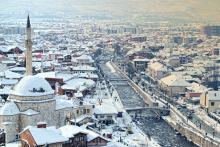
Three years ago, Joshua Stanton was walking around Peja, a Balkan city where the skyline is punctured with the dainty minarets of three historic mosques, when he decided to put on his yarmulke.
“I am Jewish,” he thought. “I want to put it on.”
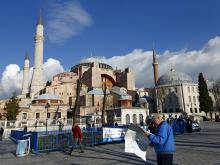
Turkish authorities have allowed Hagia Sophia, a World Heritage site, to be used for Ramadan prayers, an act that has enraged Orthodox Christians who say the famed former church and mosque is supposed to be off-limits for any religious ritual.
Prayers for the holy Muslim month were first read at the start of Ramadan on June 8, prompting a swift and pointed response.

The killings of two Hindus, one Christian, and the wife of an anti-terror official in Muslim-majority Bangladesh last week have left members of minority religious communities afraid for their lives and skeptical of the government’s ability to provide security.
Separate targeted attacks on Hindus, Christians, Buddhists, and atheists have left the country reeling. On top of the violence, some churches have received death threats from Islamist militants.

One year after the Supreme Court ruled that gays can legally marry across the country, and at a time when most polls show a majority of Americans support LGBT equality, the mass shooting in Orlando, Fla., shocked many Americans who had begun to take gay rights for granted.
Not only did the shootings at the Pulse nightclub occur during Pride month, when LGBT people and supporters across the U.S. celebrate the gains they have made toward equality, they also took place at a gay club — historically a safe gathering place for LGBT people, especially back when no other establishments would welcome them.

While many countries in Europe have sealed their borders to refugees, Germany has done the opposite. Last year, the country registered over 1 million asylum seekers, including 425,000 from ravaged Syria.
No other country in the European Union has accepted as many. For Syrians and others who risk their lives crossing the Mediterranean Sea in rubber dinghies, Germany has become a beacon of hope.
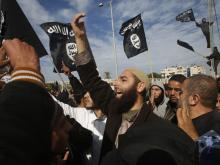
American journalists routinely report on Islamist extremists such as the group that calls itself the Islamic State, or ISIS, without mentioning one of the key doctrines that inspires them.
Whether translated loosely as “us vs. them” or more precisely as “allegiance-disassociation,” “wala wal-bara” is a foundational doctrine of Salafism, the Sunni purist movement that has become a major force in Middle Eastern politics.

Tunisia’s Ennahda movement, the most successful Islamist party to emerge from the Arab Spring revolts early in this decade, has renounced political Islam and declared it will operate in the country’s politics as “Muslim democrats.”
A party congress over the weekend in the beach resort of Hammamet voted almost unanimously to drop Ennahda’s traditional religious work and participate in Tunisian politics as a regular political party.

IN DECEMBER 2007, Naomi Mwangi, a Christian, fled her home in Kisumu, Kenya, as men with machetes attacked towns across the region. For five weeks violence raged nationwide. When the bloodshed ended, more than 1,300 Kenyans were dead and another 650,000 had been displaced. Mwangi and her family ended up living in the Maai Mahiu refugee camp, south of Nairobi. She was 12 years old.
Mwangi is coming of age in a society with ethnic violence in the background, extremist violence in the foreground, and massive economic inequality. Africa has the highest concentration of young people in the world and more than half of them are unemployed. Mwangi wanted something different—she wanted to work for peace.
Now 21, Mwangi is a leader in grassroots peacemaking campaigns that seek to end conflicts between the 42 ethnic groups in this majority-Christian country. The 2007 election violence pitted Christian against Christian, as ethnic ties trumped religious affiliation. Even now, during elections, Mwangi told Sojourners, “Leaders motivate youth to join in the political crisis ... to fight against another tribe.”
A major obstacle to social and economic stability among youth in Kenya is unequal distribution of government-issued identification cards. Kenyans need ID cards for everything from voting and university enrollment to obtaining grants for entrepreneurship programs. But historically, the ruling government doled them out as political favors, and they’ve often been denied to members of minority groups.
“There are plenty of applications at election time,” Mwangi said, explaining that the ID process is slowed down or delayed when it seems one ethnic group could tip the chances of a politician who represents a different group.
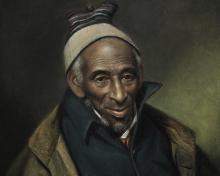
"Islam Hates Us!"
The recurring headline screams across every kind of media. Fear-based stories about Muslims have become standard fare this election cycle, rooted in the notion that Muslims are recent arrivals in America and somehow don’t belong. Some go so far as to suggest Muslims need to be plucked out from American society and “sent back home.”
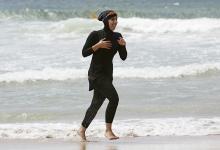
Burkinis aren’t showing up at the beaches on either side of the English Channel yet, but the thought that the full head-to-ankle swimsuit might catch on among Muslim women in Europe has already sparked lively debates in Britain and France.
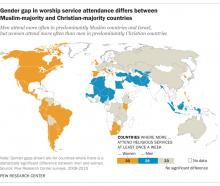
Fewer men than women show up in U.S. churches, and women are markedly more likely to pray and to hold up religion as important. But in Muslim nations, it’s the women who are missing in action at the mosque — and yet they’re on par with men in upholding almost all the Muslim pillars of faith.
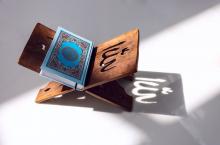
In 2005, Amina Wadud stepped in front of a crowd of one hundred Muslims, women and men, to offer a sermon and lead them in prayer — something previously unheard of for a woman to do. Wadud has been vocal about gender equality in Islam for decades. She is a prominent speaker, writer, and scholar of Islamic studies. But I didn’t know of her until my senior year of college. In my last class as an undergraduate student, I decided to take a class on Islam. I was intrigued by our reading list at the beginning of the semester, but Amina Wadud and her book, Inside the Gender Jihad: Women’s Reform in Islam, were just words on my syllabus.
To protest the anti-Muslim rhetoric of this presidential campaign, high school counselor Martha DeVries decided to wear a hijab in public every Monday. DeVries, 47, attends a Baptist church and identifies as “a follower of Jesus,” but said she felt a responsibility to outwardly display her acceptance of Muslims and refugees.
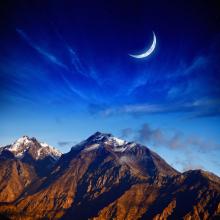
It all began for me as a young girl, spending many childhood summers with my aunt — my father’s eldest sister. Her name was Hilal, which means “crescent moon” in Arabic. No name could have been more appropriate for her — just as the spiritual lives of Muslims center on the crescent moons of the lunar calendar, my family’s spiritual center stood upon this strong minded, faithful, and dedicated matriarch.

Sudanese Christians and human rights groups are urging the government to produce two clerics, whose location has been unknown since their arrest in December. Hassan Kodi, 49, secretary general of the Sudanese Church of Christ, and another pastor, Telal Ngosi, 44, were detained after attending a Christian conference in Addis Ababa, Ethiopia, in October. The two represented the Sudanese Church of Christ at a meeting to discuss the plight of Christians in Sudan and South Sudan.

Our Founders knew that religious liberty is essential not only to protect religion, but because religion helps strengthen our nation. From our Revolution to the abolition of slavery, from women’s rights to civil rights, men and women of faith have often helped move our nation closer to our founding ideals. This progress is part of what makes us a beacon to the world.
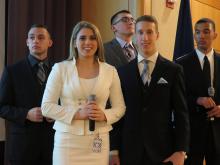
Last fall, 16 West Point cadets — none of them Muslim — signed up for an elective on counter-terrorism and created a Facebook page to appeal to young Muslims thinking about joining the so-called Islamic State group. The cadets aimed to convince those tempted by the terrorist cause to see jihad in Islam as a peaceful endeavor. For their project to succeed, the cadets knew, they would have to learn more about the faith, and build a social media platform that reserved judgment even on those who expressed admiration for committed terrorists.
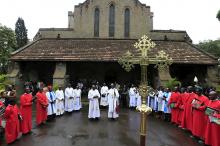
A Muslim man who shielded Christians after a passenger bus was ambushed by suspected al-Shabab militants is being saluted as a symbol of unity. Salah Farah, a schoolteacher, died Jan.18 in Nairobi, where he was airlifted after being shot in the arm and hip when he resisted militant demands that he identify Christians on the bus during the December attack.
Pope Francis is studying an invitation to visit the Grand Mosque of Rome — extended to him several days after his first visit to the city’s Great Synagogue. If he accepts, Francis would be the first pope to visit the mosque. He received the invitation on Jan. 20 during a short audience he gave to Muslim community leaders at the Vatican.
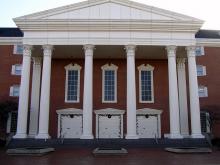
What is revealed to the world at the Epiphany in the Incarnation is that God’s language to the world is embodied Love. Jesus, whom Muslims revere as a prophet, is the message of God’s love for those who were previously deemed beyond love’s boundaries. What Jesus reveals through his life, death, and resurrection is that it is we humans who cast out, and God who draws in. God’s love excludes no one. Jesus is God’s revelation that Love has no boundaries.